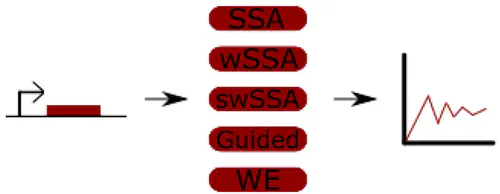
Abstract
Rare events are of particular interest in synthetic biology because rare biochemical events may be catastrophic to a biological system by, for example, triggering irreversible events such as off-target drug delivery. To estimate the probability of rare events efficiently, several weighted stochastic simulation methods have been developed. Under optimal parameters and model conditions, these methods can greatly improve simulation efficiency in comparison to traditional stochastic simulation. Unfortunately, the optimal parameters and conditions cannot be deduced a priori. This paper presents a critical survey of weighted stochastic simulation methods. It shows that the methods considered here cannot consistently, efficiently, and exactly accomplish the task of rare event simulation without resorting to a computationally expensive calibration procedure, which undermines their overall efficiency. The results suggest that further development is needed before these methods can be deployed for general use in biological simulations.